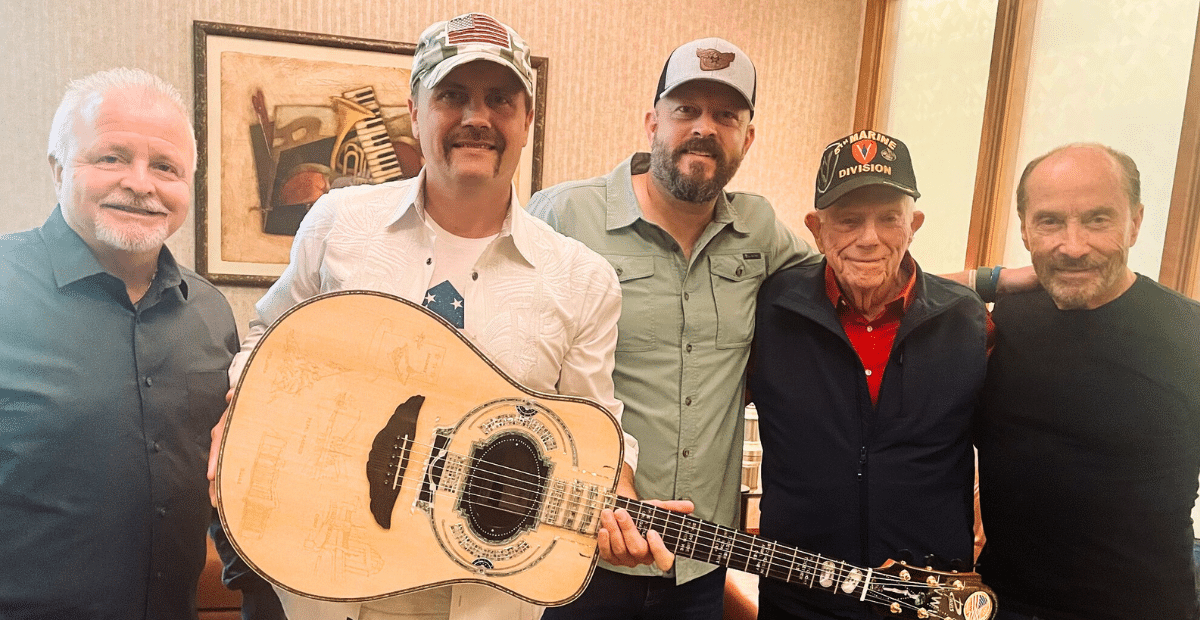100-Year-Old WWII Veteran Shares His Story In Powerful New Country Song
on Jun 25, 2025

Don Graves’ Ballad Is A Celebration Of The Greatest Generation
For many years now, retired Corporal Don Graves has been singing patriotic songs at concerts and sporting events, but now, at 100 years old, he has written a song of his own.
Signing his record deal with BMI in May, country stars John Rich and Lee Greenwood were enlisted to sing Graves’ song, titled “The Sand of Iwo Jima.”
Graves has a unique distinction as a living survivor of the Battle of Iwo Jima, serving as a flamethrower operator in the famed World War II battle which foreshadowed the Allied victory in the Pacific.
His song tells some of his story, and now everyone can hear it.
Hear Don Graves’ Story In Song
Shared on YouTube by one of the song’s cowriters, Frank Myers, “The Sand of Iwo Jima” is set to a video of the song being recorded at Starstruck Studios in Nashville, Tennessee.
We see Graves signing his record deal contract and speaking with some local press, but we also see the recording process, with John Rich and Lee Greenwood singing in the booth.
“Jason Sever and I wrote this song with him and for his 100th birthday he was brought to Nashville to record it,” Myers wrote on YouTube. “A special thank you to John Rich and Lee Greenwood for surprising him that day and singing the song! May God bless Don Graves and all our warriors who have fought for freedom around the world for all of us.”
Listen to the song, here:
In the song, a picture of life leading up to the song’s titular battle is painted.
Describing the Japanese volcanic island of Iwo Jima as “a patch of dirt out in the ocean that Roosevelt had to have,” John Rich can be heard singing of the bloodshed that island would see on February 19, 1945. “We lost 7,000 men there, so six could raise that flag.”
The chorus proudly declares:
“We fought for our freedom, we fought for the flag, we fought for each other, and we had each other’s backs. I still pray for my brothers that made that sacrifice on the sand of Iwo Jima in 1945.”
Then, Lee Greenwood, with his knack for communicating stories through song, sings about the world Graves had grown up in before leaving for war. Even with the Great Depression, Graves’ song sings of how that struggle made him and his peers from the greatest generation stronger.
By the end of the song, Rich and Greenwood come together, singing Graves’ words, “I still see those soldiers’ faces, I still hear their battle cries.”
More About Don Graves
In a photo series on World War II veterans done by photographer D. Clark Evans, Graves shared that he had dropped out of high school when he was 17 in 1942 so that he could join the Marines, just like his father had done before him.
Leading up to the battle that would mark his life, he was stationed in New Zealand and, later, in the states before being deployed to Japan.
“I landed in the third wave on February 19 at 8 in the morning. On the beach, we knew this wasn’t going to be easy; we couldn’t move, we couldn’t get up. Guys were getting killed. Every time they’d go over the top, they’d drop. I was on the beach at least two hours. It took us three days to go 540 feet to Suribachi — inch by inch, foot by foot, shell hole by shell hole.”
He even remembers some of the horrors of war, sharing:
“On the morning of the third day, we finally made it to the foot of Suribachi and had a grenade fight going up. I burned out a few pill boxes. I saw one Jap going into a pill box and yelled at him. All of a sudden, he came out. He had a beautiful uniform on and a beautiful sword. I thought, this guy is going out in style. He looked at me, had something in his hand, then boom! He was gone; there was nothing left of him. It took us all day to climb Suribachi.”
According to a spotlight on Graves done for the Christian Broadcasting Network, after the war, Graves moved back home to Detroit, where he married Rebecca.
He recalls struggling to adjust to civilian life, and nearly ruining his marriage as he began drinking. However, seeing a film of a Billy Graham sermon in 1954 changed his life.
Both he and his wife became Christians, and he said, “I fell in love with the Bible. I just fell in love with that blessed book. [God] put me in the ministry for 32 years. Had a great time and I worked hard.”
Reflecting his inner change, Graves then became a minister.
Together, he and his wife Rebecca had four children.
Rebecca passed away in 2016.
Related: 100-Year-Old Veteran Sings National Anthem Before NASCAR Race












